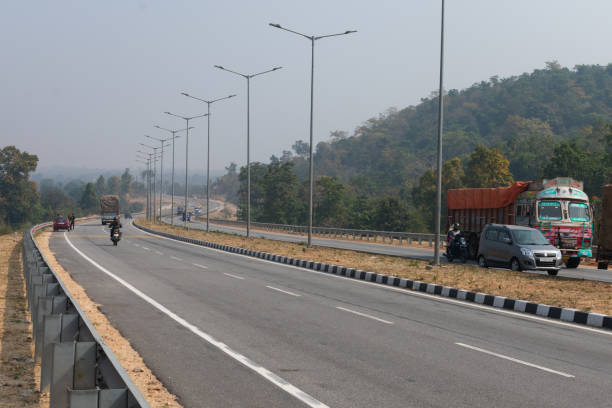Industry reaction to National Highways’ priorities for its third Roads Investment Strategy (RIS3), 2025 to 2030, has been mixed following its publication yesterday. The Strategic Road Network Initial Report for 2025-2030 from National Highways sets out its advice to government on priorities for England’s motorways and A-roads for the next five year investment period. It has confirmed that its focus will be on maintaining and upgrading the strategic road network rather than starting new roads. This comes after the government announced in March that several major road schemes will be “rephrased” due to challenging economic headwinds. National Highways’ recommendations for RIS3 will be taken into account by central government. Speaking at NCE’s UK Roads conference yesterday, National Highways director of strategic planning and analysis Adam Simmons commented: “It’s very much a government decision about how much to invest, where to invest and what the priorities are […] We are actually at a very critical stage of having that negotiation with government.” Also speaking at the UK Roads conference, Daft director of roads strategy David Buttery said that the department is “negotiating with the Treasury at the moment in terms of the size of the RIS3 envelope and what it means for the RIS3 outputs”. He added that it is “fighting hard for as much as [it] can”. It is therefore still “some months” until these decisions are settled and a draft RIS3 and statement of funds available will be published, according to Simmons. At that point, National Highways will start “putting the meat on the bone” of its plans for RIS3, Simmons said. “We’re at that point of inflection between deciding what needs to be done and then we’ll go into the planning,” he said. Speaking further about National Highways’ priorities for RIS3, laid out in the Initial Report, Simmons said that increasing the standard of roads with the lowest International Road Assessment Programmed (IRAP) rating is key. “These are investments where we can enhance the network, we can do things like improving line of sight and layout of roads to make safety improvements,” he said. “They can make a massive difference, comparatively cheaply to other bigger corridor enhancements and widenings. They offer very strong value for money.”

While The Focus on Building New Roads Will Be Reduced.
schemes that have carried over from RIS2 will continue. Based on extensive engagement with stakeholders, Simmons said that a priority that’s come through is completing corridors, particularly on A roads. “So where we might have dulled sections we’re going to see more carriageway sections, [focusing on] how do we make that a more continuous and contiguous service along those corridors,” he said. He also touched on maintaining assets. “Getting the right level of investments on our major renewals activity is really key and I think if we get the investment right, we can intervene at the right time to renew those assets [with minimal] impact on our customers.” He added that renewals investment priorities will be around structures, concrete and flexible pavement. Replacing and upgrading obsolete roadside tech will also be a priority. Also among National Highways’ priorities is improving the user experience with increased data to provide real-time information about congestion and roadworks. Reactions to National Highways’ priorities for RIS3 have been split. CECA director of operations Marie-Claude Hemming said: “These proposals, which focus on both maintenance, renewals and delivering existing planned schemes, are a positive step towards ensuring the road network can sustain projected demand. “Provided the current pipeline of schemes is delivered in full and is complemented by the finalization and delivery of the next wave of Route Based Strategies these plans will improve the condition of England’s roads, improve safety for both drivers and pedestrians, and boost much-needed economic growth. “An under-resourced roads network will only cost the UK economy billions of pounds a year in lost productivity, increased fuel use, and missed opportunities for economic and social growth. “That’s why we are calling on the government to clearly and unambiguously commit to the level of investment necessary to support the projected needs of communities and businesses while transitioning to a carbon neutral economy.

“CECA Members Have The Skills And Resources to Deliver World-Class.
road infrastructure projects on time and on budget, provided they have the certainty to direct investment and skills accordingly. “At a time at which other major infrastructure investments have been thrown into doubt by economic uncertainty, it is essential that government and industry work together to ensure the third road investment period is a success in building a better future for the nation’s roads and road users.” A spokesperson for the National Infrastructure Commission said: “It is right for RIS3 to plan for investment in maintaining and renewing the existing network as a top priority, not least because of the growing risks from climate change to ageing assets. But as the documents also make clear, the need for targeted enhancements remains if we are to promote economic growth across the country. National Highways’ route strategies, alongside the Commission’s recent advice on how to priorities future investment, need to inform scheme plans that keep pace with the needs of road users and the economy. More widely, RIS3 should also be the first step towards a longer-term interurban transport strategy that prioritizes effectively between road and rail.” Transport Action Network director Chris Todd warned that National Highways and the government are “heading down the wrong road”, saying: “With a new report this week revealing that the Dot’s own data shows radical traffic reduction is needed to meet climate targets, we need a new plan, not a rehashing of existing road building plans. Carrying over major climate busting schemes from RIS2 to RIS3 like the Lower Thames Crossing, A303 Stonehenge, and the A66 Northern Trans Pennie shows it’s business as usual for the Daft, which continues to drag its feet on climate action. It’s like it’s reheating yesterday’s leftovers, rather than coming up with anything appetizing. “Instead we need a radical roads reset to give people and freight greener ways to travel. We need a strategy to reduce congestion, not make it worse by building more roads and increasing traffic.” An Arup spokesperson said: “The SRN Initial Report and Connecting the Country document set out a clear future direction for National Highways, with a focus on enabling fleet decarbonization and low carbon construction. There’s a clear roadmap to leveraging digital technologies to optimize flow, reduce carbon emissions and provide a far more connected experience for the customer.

“The Future Investment Focusses On a Substantive.
renewals and maintenance programmed, needed to maintain an asset largely built over the 1960s-80s. This significant new intent by National Highways recognizes that the network is relatively mature, with RIS3+ investments channeled to targeted enhancements around junctions, improving safety, enabling active travel and crucially, connectivity to other transport modes.” Sub-national transport body Midlands Connect responded positively to the priorities, saying: “Midlands Connect welcomes the initial proposals laid out National Highways and we welcome their acknowledgment of our work and the importance of roads like A50/A500, in Grantham, the A46, Junction 28 of the M1 and the A5 “The collective work of the Midlands, created shared priorities and working together, with one voice has really shown to work and that shows clearly through these documents. We understand these plans are at the early stages of development and with tighten public finance and the ever increasing pressures due to climate change it will be extremely important for all of us to continue to work with National Highways in the coming months as these plans evolve. “Midlands Connect will continue to engage constructively with National Highways and we plan to submit to their consultation on these strategies shortly.”


Recent Comments